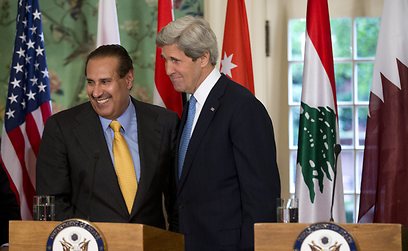
Israel's prime minister insisted Wednesday that the conflict with the Palestinians is not about territory, rather the Palestinians' refusal to recognize Israel as the Jewish homeland, appearing to counter a modified peace proposal from the Arab world.
Benjamin Netanyahu has not commented directly on the Arab League's latest initiative, but his words questioned its central tenet - the exchange of captured land for peace.
Related stories:
- Op-ed: Jew hatred at UN schools
- Arabs soften stance on Israel's final borders
- Livni: Arabs realized border must change
The original 2002 Arab initiative offered a comprehensive peace between Israel and the Muslim world in exchange for a withdrawal from all territories Israel captured in the 1967 Mideast war. Sweetening the offer this week, the Arab sponsor said final borders could be drawn through mutually agreed land swaps.
Netanyahu questioned the premise that borders are the key.

Al Thani (L) and Kerry during press conference, Tuesday (Photo: AP)
"The root of the conflict isn't territorial. It began way before 1967," he told Israeli diplomats. "The Palestinians' failure to accept the state of Israel as the nation-state of the Jewish people is the root of the conflict. If we reach a peace agreement, I want to know that the conflict won't continue - that the Palestinians won't come later with more demands."
The Palestinians have rejected Netanyahu's demand to recognize Israel as the Jewish state, saying it would undermine the rights of Israel's Arab minority as well as millions of refugees scattered throughout the world whose families lost properties during the war surrounding Israel's establishment in 1948. The fate of the refugees is a core issue that would need to be resolved as part of a final peace deal.
Though Netanyahu's office has remained silent on the modified Arab proposal, his chief peace negotiator, Justice Minister Tzipi Livni, has welcomed it, as have Israel's president and the main opposition parties. However, Netanyahu's own political base and one of his main government coalition partners are either opposed to giving up land or suspicious of the Arabs' motivations.
Qatari Prime Minister Sheik Hamad Bin Jassem Al Thani tried to allay some of the Israeli concerns as he presented the offer on Monday.
Speaking on behalf of an Arab League delegation, he reiterated the need to base an agreement between Israel and a future Palestine on the 1967 lines, but for the first time, he cited the possibility of "comparable," mutually agreed and "minor" land swaps between the Israelis and the Palestinians.
The US has been trying to restart long-frozen peace talks with the Palestinians, and Secretary of State John Kerry called the new peace plan a "very big step forward." Palestinian officials were cool to the concept.
The original 2002 Arab peace initiative offered Israel peace with the entire Arab world in exchange for a "complete withdrawal" from territories captured in the 1967 Mideast war. The Palestinians claim the West Bank, east Jerusalem and the Gaza Strip, all seized by Israel in 1967, for their future state. Israel withdrew from Gaza in 2005.
Though the latest proposal appears aimed at the Palestinians, the original formula refers to other territories as well. Israel also captured the Sinai from Egypt and Golan Heights from Syria in the 1967 war, withdrawing from Sinai in 1982. Peace talks between Israel and Syria over the fate of the Golan failed more than a decade ago.
- Receive Ynetnews updates
directly to your desktop















